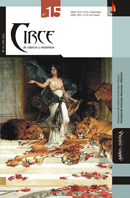The pseudo-anonymity of the Ecloga in obitu in manuscript 1631 (BNM)
Keywords:
eclogue, Neo-Latin Literature, JesuitsAbstract
According to Ignacio OSORIO ROMERO (1989), the manuscript 1631 of the National Library of Mexico is the richest source of Neo-Latin literature in New Spain, during the sixteenth and seventeenth centuries. The codex is a compilation of Latin texts produced between 1585 and 1629 on the occasion of religious festivals, literary contexts or social events. There are twelve Latin poems included between folios 109 r and 120 r, of which eleven are eclogues. The first head of selection, entitled Ecloga in obitu, is anonymous. Mexican critic considers that this poem is perhaps a rhetorical exercise. However, the 28 anonymous verses contained in the codex belong to the Italian Baldassare Castiglione. The authorship of these hexameters collapses OSORIO ROMERO’s theory, published already for several years, and opens from here a series of questions that will be addressed in future research.
Downloads
Downloads
Published
Issue
Section
License
Los autores que tengan publicaciones con esta revista, aceptan los términos siguientes referidos a los derechos de autor/a:
1. Los autores/as conservarán sus derechos de autor y garantizarán a la revista el derecho de primera publicación de su obra, el cuál estará simultáneamente sujeto a la Licencia de reconocimiento de Licencia Creative Commons Atribución-NoComercial-CompartirIgual 4.0 Internacional (http://creativecommons.org/licenses/by-nc-sa/4.0/). que permite a terceros compartir la obra siempre que se indique su autor y su primera publicación esta revista. El autor es el titular del copyright.
2. Los autores/as podrán adoptar otros acuerdos de licencia no exclusiva de distribución de la versión de la obra publicada (postprint) siempre que se indique la publicación inicial en esta revista. La cesión de derechos no exclusivos implica también la autorización por parte de los autores para que el trabajo sea depositado en el repositorio institucional y difundido a través de las bases de datos que el editor considere adecuadas para su indización, con miras a incrementar la visibilidad de la publicación y de sus autores.
3. Se permite y recomienda a los autores/as difundir su obra a través de Internet antes y durante el proceso de envío, lo cual puede producir intercambios interesantes y aumentar las citas de la obra publicada.







.jpg)









2.png)



